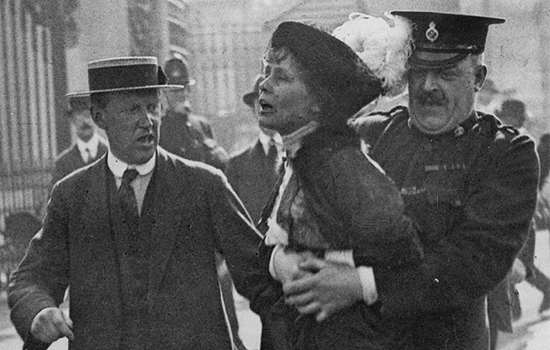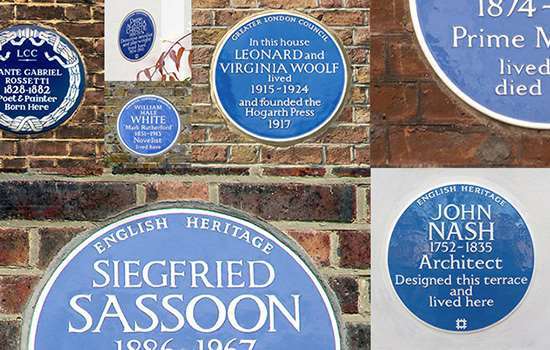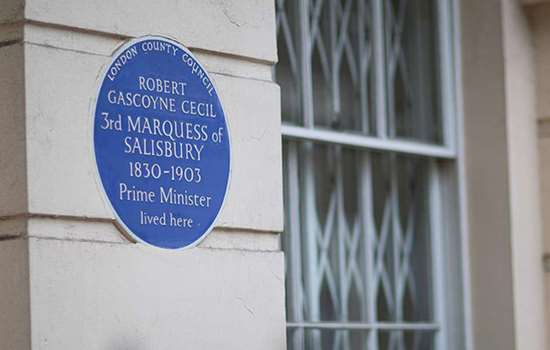GOLDIE, Grace Wyndham (1900–1986)
Plaque erected in 2022 by English Heritage at Flat 86, St Mary Abbots Court, Warwick Gardens, Kensington, London, W14 8PH, Royal Borough of Kensington and Chelsea
All images © English Heritage
Profession
Television producer and executive
Category
Radio and Television
Inscription
GRACE WYNDHAM GOLDIE 1900–1986 BBC executive and pioneer of political coverage on television lived in Flat 86 from 1935
Material
Ceramic
Grace Wyndham Goldie, television producer and one of the few women executives of her era at the BBC, is commemorated with a blue plaque at St Mary Abbots Court, Warwick Gardens, Kensington, where she lived in Flat 86 from 1935. Having early understood the potential of television, she was a powerful influence in bringing politics and current affairs to the small screen, and in giving a critical edge to this coverage.
Education and early career
Born in Arisaig, Inverness-shire, on 26 March 1900, Grace Wyndham Goldie, née Grace Murrell Nisbet, was the middle child of Robert, a civil engineer, and Alice. Her early childhood was spent in Scotland, then in Egypt where her father was employed in the Egyptian government service, until the family returned to England in 1916.
Grace received a degree in history from Bristol University in 1921, followed by a degree in philosophy, politics and economics from Somerville College, Oxford, in 1924. She was head of history at Brighton and Hove High School until 1928, when she married the actor Frank Wyndham Goldie and they moved to Liverpool. Grace became a playreader at the Liverpool Repertory Theatre (where Frank had secured a contract as leading man) and took on part-time jobs as a drama teacher with the Workers’ Educational Association and as a university history examiner.
Life in London
In 1935 the couple relocated to a flat in the newly built mansion block at St Mary Abbots Court, Kensington. A chance meeting at a dinner party that year saw Goldie seated next to Richard Lambert, editor of The Listener, the BBC’s weekly magazine; he soon offered her a job as the magazine’s radio drama and entertainment critic. The first regular high-definition television service was formally begun on 2 November 1936, and from then on Goldie included television reviews in her regular articles. An early champion of the medium of television, she wrote in The Listener on 16 June 1937:
This miracle, this phenomenon, is here and it’s part of our daily lives … or at least it will be as soon as the sets become cheaper and we can afford to buy them.
While the BBC suspended its television service from 1939 to 1946, Goldie continued to cover radio drama for The Listener until 1942, when she took a wartime contract post at the Board of Trade in supplies and rations distribution. For around two years during the war, she lived in temporary lodgings before returning to St Mary Abbot’s Court in 1945, where she remained until her death in 1986. It was from her Kensington home that she began and ended her long career with the BBC, and held social events and after-programme drinks for politicians and senior producers.
In 1944 Goldie returned to the BBC as a radio talks producer, and finally moved into television in 1948 as a producer, then based at Alexandra Palace. There she delivered current affairs programmes including Press Conference (from 1952), at the time the only regular political programme on television. She is credited with introducing a live results programme for the 1950 general election, complete with presenter, political scientist, election map and outside broadcast camera at Trafalgar Square. She also came up with the format of three 15-minute party election broadcasts ahead of the general election of October 1951, featuring the leaders of the three main parties.
BBC executive
As the BBC’s assistant head of television talks, Goldie directed coverage of the elections in 1955, 1959 and 1964. She took over Panorama in 1955 – then hosted by Richard Dimbleby, who was also main anchorman for those three elections broadcasts – and led other current affairs programmes covering politics, arts and science.
Goldie was awarded an OBE in 1958, and the BBC extended her appointment for five years when she reached normal retirement age in 1960. She became head of their Talks and Current Affairs Group in 1962, where she was responsible for documentaries, public affairs and travel programmes, and science talks.
Goldie retired in 1965, by which time television was fully established as a medium that worked for politics as well as for entertainment, and politicians were accustomed to appearing on screen. She kept working part-time in the sector, including making recommendations on archiving policy at the BBC. She died at her Kensington home on 3 June 1986, aged 86.


